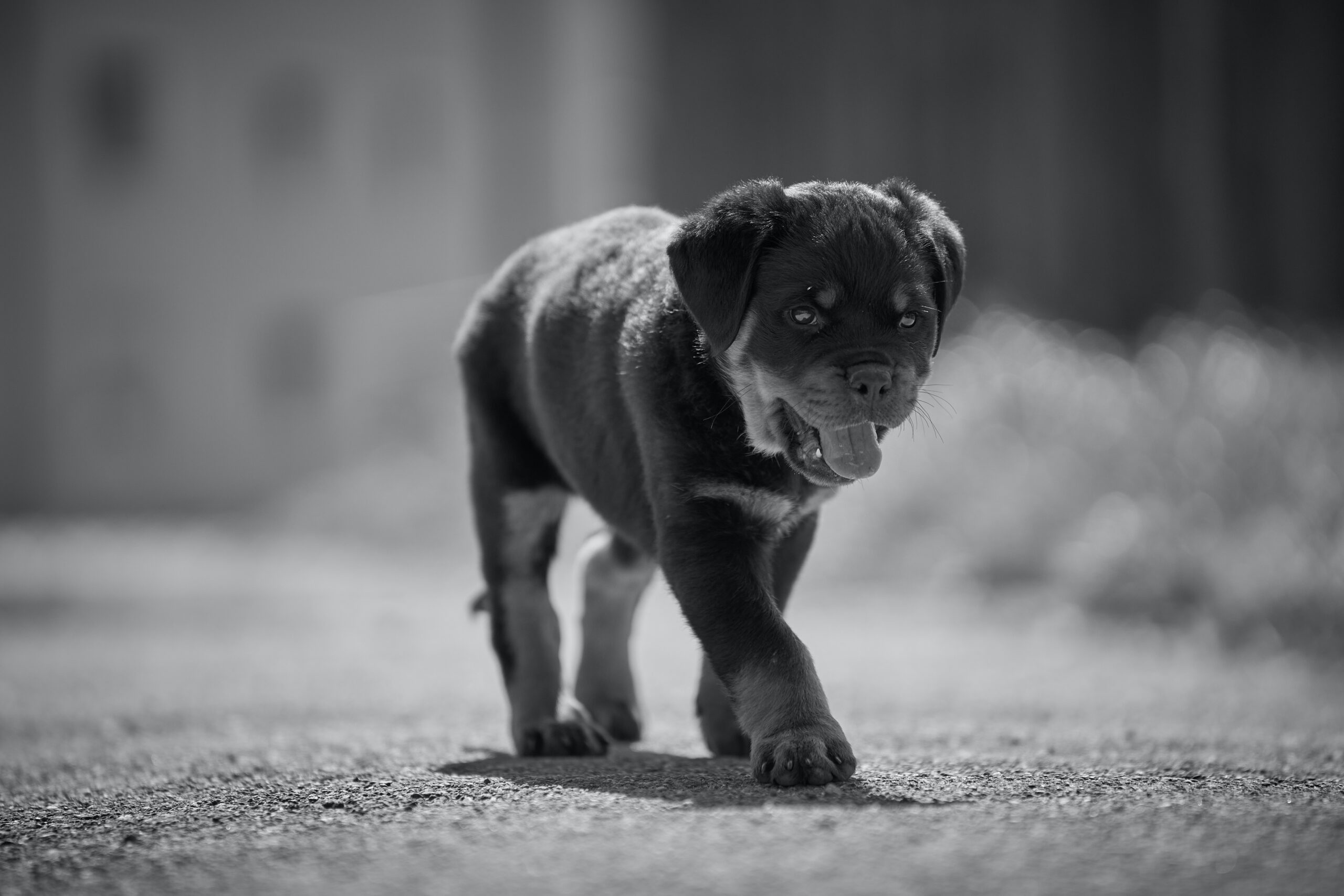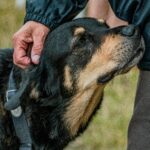Rottweiler puppies are adorable and full of energy, but like all puppies, they can also be a handful. They can exhibit certain behavioral problems that can be challenging for new owners. In this article, we will explore some Rottweiler Puppy Behavior: Common Problems & Solutions to help you raise a well-behaved and happy Rottweiler.
RELATED TOPICS:
- Rottweiler Behaviors: Myths vs Facts
- Rottweiler Behavior Problems: Solutions for Common Challenges
- Facts About Rottweiler Behavior & Characteristics
- How To Discipline A Rottweiler’s Bad Behavior
One of the most common Rottweiler puppy behavior problems is chewing. Rottweiler puppies have a natural urge to chew, and they can chew on anything they can get their paws on, including shoes, furniture, and household items. To prevent this behavior, it’s important to provide your Rottweiler puppy with plenty of appropriate chew toys, like durable rubber toys or bones, and to supervise them when they are not in a safe space.
Another common behavior problem is barking. Rottweiler puppies can bark excessively due to boredom, anxiety, or lack of training. To prevent this behavior, it is important to provide your Rottweiler puppy with plenty of exercises, mental stimulation, and positive reinforcement training. Teaching them to be quiet on command can also be helpful in curbing excessive barking.
Rottweiler puppies can also be prone to digging, another common behavior problem. This is usually due to boredom or a lack of exercise. To prevent this behavior, it’s important to provide your Rottweiler puppy with plenty of exercises and to supervise them in the yard. Providing them with a specific digging area, such as a sandbox or digging pit, can also help to channel this behavior in a positive way.
Another behavior problem that Rottweiler puppies can exhibit is dominance. Rottweilers are a strong-willed breed and need clear boundaries and consistent training to prevent dominance issues. It is important to assert yourself as the pack leader and use positive reinforcement training to teach them to obey commands.
Rottweiler Puppy Behavior Stages
As they grow and mature, Rottweiler puppies go through many behavioral phases. You can better understand and control your Rottweiler puppy’s behavior if you are aware of these stages. This article will discuss the various behavioral phases that a Rottweiler puppy goes through and offer advice on how to deal with each phase.
- The neonatal stage, which lasts from birth to two weeks of age, is the first stage of Rottweiler puppy behavior. Puppies are totally reliant on their mother at this age and aren’t yet able to see or hear. The majority of their time is spent napping and nursing.
- The transitional stage, which lasts from two to four weeks of age, is the second stage. Rottweiler puppies go through this stage where they start to explore their environment and start to develop their senses. Additionally, they are beginning to become more animated and fun.
- The socializing period, which lasts from four to twelve weeks of age, is the third stage. It’s crucial to introduce Rottweiler puppies to a variety of people, animals, and situations during this stage since they are quite impressionable. The ideal time to begin their fundamental instruction and socialization is now.
- The juvenile stage, which lasts from three to six months of age, is the fourth stage. At this period, Rottweiler puppies start to develop greater independence and more distinct personalities. Additionally, they become more animated, playful, and outspoken at times. At this point, kids start to test and push the boundaries.
- Adolescence, which lasts from 6 months to 2 years of age, is the final and fifth stage. As they progress through this stage, Rottweiler puppies may start to confront their owners for dominance. During this phase, it’s crucial to keep up with training and socializing.
What Age Do Rottweiler Puppies Calm Down?
Rottweiler puppies are known for their high energy and playful nature, but as they grow and mature, they will start to become calmer and more relaxed.
The age at which Rottweiler puppies begin to calm down can vary, but generally, they start to settle down around the age of 1 to 2 years. During this time, they will begin to lose some of their puppy-like energy and become more confident and self-assured.
However, it’s important to note that even when Rottweiler puppies have calmed down, they still require regular exercise and mental stimulation to keep them physically and mentally healthy.
Additionally, proper training, socialization, and positive reinforcement during the early stages can help to speed up the process of a Rottweiler puppy becoming calm and well-behaved.
How Do You Control A Rottweiler Puppy?
Controlling a Rottweiler puppy requires a combination of proper training, socialization, and positive reinforcement. The key to effectively controlling a Rottweiler puppy is to establish yourself as the pack leader and to set clear boundaries and rules.
First, it’s important to provide your Rottweiler puppy with proper training and socialization. This includes teaching them basic commands such as “sit,” “stay,” “come,” and “heel.” Socializing them with other dogs and people during the socialization stage is also important for them to learn to behave well with others.
Second, establish clear rules and boundaries for your Rottweiler puppy. This includes designating specific areas where they can play and chew and setting limits on when they can have treats or go outside. Consistency is key when setting rules and boundaries, as this will help your Rottweiler puppy understand what is expected of them.
Third, use positive reinforcement techniques when training your Rottweiler puppy. This includes rewarding them with treats, praise, and playtime when they exhibit good behavior. Avoid using physical punishment or negative reinforcement, as this can lead to aggressive or fearful behavior.
Lastly, it’s important to provide your Rottweiler puppy with plenty of exercises and mental stimulation. This includes taking them for regular walks, providing them with interactive toys, and engaging them in training and obedience exercises. This will help to keep them physically and mentally healthy and reduce the likelihood of destructive or disobedient behavior.
Final Thoughts About Rottweiler Puppy Behavior: Common Problems & Solutions
In conclusion about Rottweiler Puppy Behavior: Common Problems & Solutions, Rottweiler puppies can exhibit certain behavioral problems that can be challenging for new owners. However, with proper training, socialization, and care, these problems can be prevented or solved.
By providing your Rottweiler puppy with plenty of exercises, mental stimulation, and positive reinforcement training, you can raise a well-behaved and happy Rottweiler. Remember that Rottweiler puppies are a big responsibility, so make sure you are prepared to give them the time, attention, and training they need.







